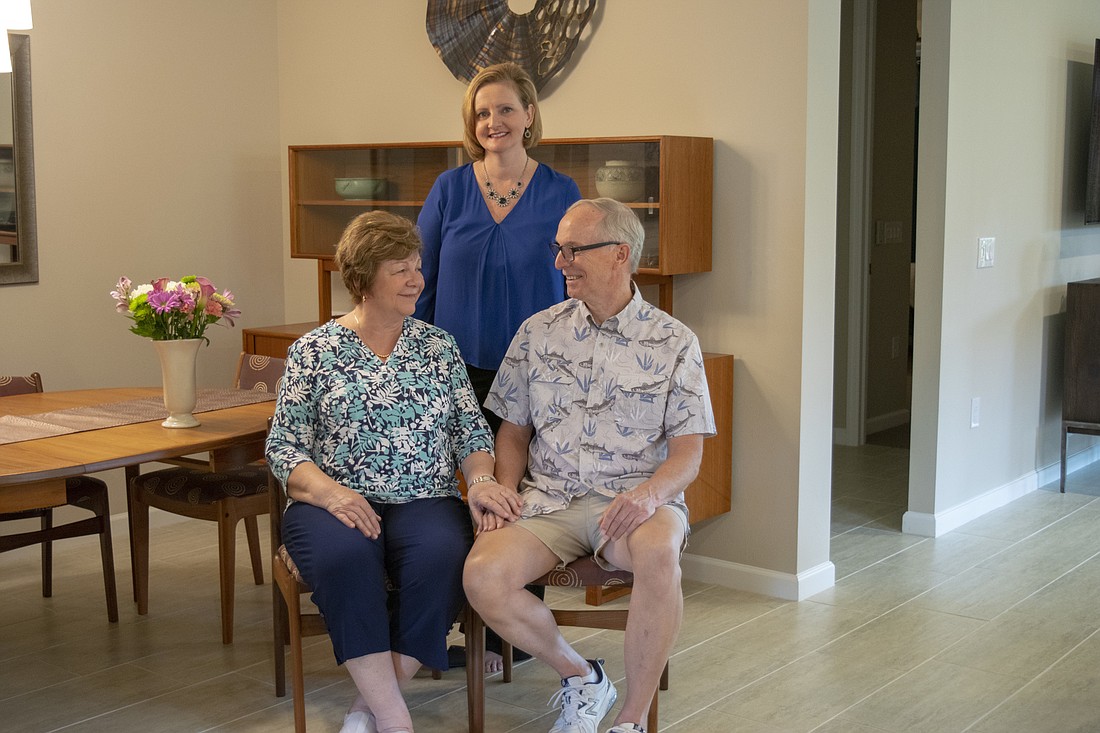- May 15, 2025
-
-
Loading

When Gary Syvertsen was diagnosed with Parkinson’s disease in November 2013 at age 63, his wife, Theresa, figured she could handle his day-to-day care. In the early stages, Gary was high-functioning and had a positive outlook about an insidious disease whose symptoms tend to emerge gradually. He was still making a weekday commute from their home in Sparta Township, N.J., to his job in Newark. The doctors had him on the proper medications.
By the time Gary retired and the couple moved to Lakewood Ranch in April 2018, he was showing signs of decline. It’s inevitable. Parkinson’s disease — a progressive neurodegenerative disorder — never takes a turn for the better, and there is no cure. The average age of onset is 60, and although the disease itself is not fatal, related complications often reduce life expectancy. Still, people can live 20 to 30 years with Parkinson’s.
“At first, I figured, ‘I can handle anything,’” Theresa recalls. “But then the stresses of having a new house to deal with and to see the changes in him, my attitude was getting bad. My personal behavior was not good.”
Then came what you might call a blessing. A few weeks after setting up house in Lakewood Ranch, Theresa heard about the Parkinson’s Expo presented by Neuro Challenge, a charitable organization that helps those with the disease “live well with Parkinson’s,” says its CEO, Robyn Faucy-Washington.
The annual event — a daylong seminar designed to educate, engage and empower the Parkinson’s community — is the largest of its kind in the U.S. For the Syvertsens, it served as a lifeline.
“We got so much out of it,” Theresa says of the April gathering that drew nearly 1,400 people. “We learned more about the disease, how to cope with it, new research, the latest medications. In one day, we got so much more than we ever did in Jersey, where’s there’s not a lot of help other than going to the doctors.”
The Syvertsens joined a community of 2,700 people served annually by Neuro Challenge, which was formed in Sarasota in 2008 by Dr. Dean Sutherland and his wife, Doreen. The organization currently operates in Sarasota, Manatee, Pinellas, Marion, Pasco and Charlotte counties.
Neuro Challenge — with eight full-time staffers — offers a vast range of services to its clientele, all of them free (on an annual budget of close to $1 million).
“We don’t call them patients or sufferers,” Faucy-Washington says. “We try to be as positive as possible. We call them people with Parkinson’s, or PWPs.”
She says Neuro Challenge’s key first message to newcomers is: “It is possible to live well with Parkinson’s. And the key component of that is education.”
The organization runs dozens of ongoing programs, such as support groups for both PWPs and caregivers (together and separately); wellness club meetings that provide education and present speakers; Movers & Shakers discussion groups for PWPs only; Off-Key Chorale, a group sing that helps improve speech and voice quality; and exercise classes in partnership with YMCAs and community centers. “Exercise is the only thing that’s been shown to slow progression,” Faucy-Washington says.
There’s more. Neuro Challenge’s four care advisers meet directly with PWPs, caregivers and family members — face-to-face or by phone — to “give them everything they need to know to manage their disease,” Faucy-Washington says.
Although Parkinson’s Disease is widely known, it is not well understood. The world at large tends to regard Parkinson’s symptoms as tremor and speech difficulties, but in reality, there are myriad symptoms, among them balance issues, a shuffling gait, difficulty swallowing, deteriorating motor skills, digestive problems, cognitive issues that affect decision-making, memory disorders (which affect more than half of PWPs) and many more.
“I like to say, ‘If you met one person with Parkinson’s, you’ve met one person with Parkinson’s,” Faucy-Washington says, emphasizing the notion that PWPs experience the disease in their own ways.
After six years, Gary Syvertsen is still relatively high-functioning.
He has very little tremor, but Theresa has to rouse him out of bed and plan the day to coax him into action. He’s gotten confused at times, speaks more slowly and softly, and has flexibility, balance and stability deficits. “Gary has to be guided — in a very gentle way,” says his wife of 47 years. “I wouldn’t have known that if I wasn’t involved with Neuro Challenge.”
She consults with care advisers and attends several caregiver meetings a month. She persuaded Gary to attend a few with her. “I never thought he’d do it, but he went and enjoyed the interaction with other Parkinson’s people,” she says.
The Syvertsens “haven’t stopped living,” Theresa says with traces of a blunt Jersey accent. Gary has his own exercise program at a nearby gym. They take walks, albeit more carefully than before. They’re planning trips. They get together with friends, go out to dinner, entertain at home.
There have been adjustments, of course. “I had to make the transition away from expecting certain behaviors from my husband that he is no longer capable of providing,” Theresa explains. “The caregiver meetings were so important in that regard, to walk in someone else’s shoes. You have to learn to accept the changes as they come. This is a very cliché thing to say, but I’m not alone with this disease.”